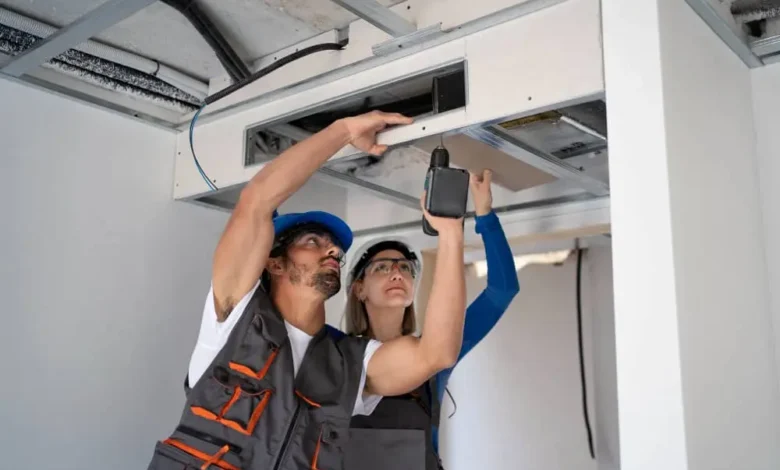Does Home Insurance Cover Heating System and Air Conditioning Repairs?
Does home insurance cover heating system and air conditioning repairs? Learn what damages are covered, state-specific rules, and additional coverage options.

Does Home Insurance Cover Heating System and Air Conditioning Repairs? A Comprehensive Guide. Heating and air conditioning systems are essential components of every home, providing comfort and maintaining indoor air quality.
However, like any mechanical system, they can break down due to various factors, such as natural disasters, wear and tear, or accidents. One of the most common questions homeowners have is, “Does home insurance cover heating system and air conditioning repairs?”
This article explores whether home insurance policies in the United States cover the cost of repairing or replacing heating and air conditioning systems, the types of damages typically covered, and how coverage varies depending on state regulations and insurance providers.
We will also address specific scenarios such as damage from hail, fallen trees, or aging systems, and provide guidance on the steps homeowners should take to protect their HVAC (Heating, Ventilation, and Air Conditioning) systems.
What Is Homeowners Insurance and What Does It Cover?
Homeowners insurance is designed to protect your home and its contents from unexpected damages caused by specific “covered perils.”
These perils typically include natural disasters, fires, theft, and accidents. Home insurance policies often consist of several coverage types, such as:
- Dwelling Coverage: Protects the physical structure of your home, including walls, roof, and floors.
- Personal Property Coverage: Covers personal belongings like furniture, electronics, and clothing.
- Liability Coverage: Offers financial protection if someone is injured on your property.
- Additional Living Expenses: Covers temporary living costs if your home becomes uninhabitable due to a covered peril.
While home insurance covers a wide range of risks, it’s important to understand that coverage for heating and air conditioning systems (HVAC) may depend on several factors, including the type of damage, the specific policy, and state regulations.
Does Home Insurance Cover Heating System Repairs?
The answer to the question, “Does home insurance cover heating system repairs?” depends on the circumstances surrounding the damage to the system.
In general, homeowners insurance will cover damage to your heating system if it’s caused by a covered peril. Let’s explore some of the common scenarios where heating systems might be damaged and whether homeowners insurance would cover the repairs.
1. Damage from Natural Disasters
Natural disasters such as hailstorms, tornadoes, hurricanes, or falling trees can severely damage HVAC systems. Here’s how insurance typically covers these types of incidents:
- Hailstorms: If a hailstorm damages your outdoor heating or air conditioning unit, this damage is usually covered by standard homeowners insurance. The same applies to other weather-related damages like windstorms or heavy rain.
- Fallen Trees: If a tree falls on your heating or air conditioning system during a storm, homeowners insurance usually covers the damage, as long as the tree fell due to a covered event (e.g., a storm or wind). However, if the tree was dead and fell due to neglect, the insurance company might deny the claim.
- Hurricanes and Tornadoes: In hurricane-prone states like Florida and Texas, insurers generally cover wind damage caused by hurricanes, which can include damage to HVAC systems. However, many policies in these states include a separate hurricane deductible, which homeowners must pay before the insurance kicks in.
- Floods: Flooding can cause extensive damage to HVAC systems, but most standard homeowners insurance policies do not cover flood damage. If you live in a flood-prone area, you will need separate flood insurance through the National Flood Insurance Program (NFIP) or a private insurer to cover this type of damage.
2. Accidental Damage
If your heating system or air conditioning unit is accidentally damaged—say, by a vehicle crashing into it or by a fire—homeowners insurance will typically cover the repairs. Fire damage, in particular, is almost always covered under standard policies, as it is one of the most common perils.
3. Wear and Tear or Age-Related Issues
Unfortunately, homeowners insurance does not cover heating system repairs for wear and tear or issues related to aging.
HVAC systems have a lifespan of 10-20 years, depending on the type and maintenance. If your system breaks down due to old age or lack of maintenance, you will be responsible for the repair or replacement costs.
- Mechanical Failure: If your furnace or air conditioner stops working due to a mechanical issue, your homeowners insurance will not cover the repair. For these types of issues, you may want to consider a home warranty, which covers the cost of repairing or replacing major home systems, including HVAC.
Does Home Insurance Cover Air Conditioning Repairs?
Air conditioning units, like heating systems, can be expensive to repair or replace. Whether your homeowners insurance covers the repair depends on the cause of the damage. Let’s break down some common causes of air conditioning damage and how they relate to insurance coverage:
1. Storm Damage
If a storm causes a tree to fall on your air conditioning unit or hail damages the outdoor condenser unit, your homeowners insurance policy will generally cover the cost of repairs or replacement.
However, as with heating systems, flood damage to air conditioners will not be covered unless you have a separate flood insurance policy.
2. Fire Damage
Homeowners insurance policies almost always cover fire damage. If a fire damages your air conditioner, the repairs or replacement will likely be covered under your standard home insurance policy.
3. Power Surges
Power surges caused by lightning strikes can damage electrical components in your air conditioning system. In many cases, homeowners insurance will cover the cost of repairing or replacing the unit if the damage was caused by a covered peril like lightning.
However, damage caused by power surges related to grid issues or outages may not be covered unless explicitly stated in your policy.
4. General Wear and Tear
As with heating systems, air conditioning units that break down due to age or lack of maintenance are not covered by homeowners insurance. You are responsible for maintaining your system and replacing it when it reaches the end of its life cycle.
State-Specific Regulations on HVAC Coverage
The rules governing homeowners insurance can vary from state to state, and insurance companies often adjust their policies to reflect the unique risks in each region.
Below are some state-specific considerations for homeowners insurance coverage related to heating and air conditioning systems:
1. California
In earthquake-prone states like California, standard homeowners insurance policies do not cover earthquake damage, including damage to HVAC systems.
Homeowners must purchase a separate earthquake insurance policy to cover damages caused by seismic activity.
2. Florida and Texas
In states prone to hurricanes, such as Florida and Texas, insurance policies often have separate deductibles for hurricane-related damage.
If a hurricane damages your heating or air conditioning system, you will need to pay the home insurance hurricane deductible before your insurance covers the repairs.
This deductible is usually a percentage of your home’s insured value and can be substantial.
3. New York
New York and other northeastern states are prone to harsh winters, which can damage heating systems. Ice storms, for example, may cause damage to external HVAC units, and in most cases, insurance will cover these damages as long as they are due to a covered peril.
4. Midwestern States
In tornado-prone areas like Kansas and Oklahoma, homeowners insurance generally covers tornado damage, including any damage to HVAC systems.
However, some insurers may require policyholders to pay a separate wind or tornado deductible before coverage applies.
Additional Coverage Options for Heating and Air Conditioning Systems
In some cases, homeowners insurance may not provide enough coverage for HVAC repairs, particularly if the damage is caused by wear and tear or mechanical failure. Below are some additional coverage options that homeowners may want to consider:
1. Home Warranties
A home warranty is a service contract that covers the repair or replacement of major home systems and appliances, including heating and air conditioning systems.
Unlike homeowners insurance, home warranties are designed to cover mechanical failures, routine breakdowns, and normal wear and tear.
- What’s Covered: Home warranties typically cover the cost of repairs or replacement for HVAC systems, water heaters, plumbing, and electrical systems.
- Cost: Home warranties usually cost between $300 and $600 per year, with service fees ranging from $50 to $150 per repair visit.
2. Equipment Breakdown Coverage
Some insurance companies offer an optional add-on called equipment breakdown coverage, which provides additional protection for appliances and home systems, including HVAC units. This coverage protects against mechanical breakdowns, power surges, and electrical failures.
- What’s Covered: Equipment breakdown coverage often includes HVAC systems, electrical systems, water heaters, and major home appliances.
- Cost: This coverage is generally affordable, with premiums ranging from $25 to $50 per year, depending on the insurer.
How to Protect Your HVAC System from Damage
While insurance may cover certain types of damage to your heating and air conditioning system, there are steps you can take to minimize the risk of damage and reduce the likelihood of needing to file a claim:
1. Regular Maintenance
Routine maintenance can extend the life of your HVAC system and prevent costly breakdowns. Be sure to schedule annual inspections and cleanings for your furnace and air conditioner.
2. Surge Protectors
Installing a whole-house surge protector can help prevent damage to your HVAC system caused by power surges during storms.
3. Tree Trimming
Keep trees around your home trimmed to prevent branches from falling on your outdoor air conditioning unit during storms.
4. Hail Guards
In areas prone to hail, installing hail guards on your outdoor HVAC unit can help protect it from damage.
Conclusion: Does Home Insurance Cover Heating System and Air Conditioning Repairs?
The question, “Does home insurance cover heating system repairs?” is complex and depends on the cause of the damage.
In most cases, homeowners insurance will cover HVAC repairs if the damage is caused by a covered peril, such as a storm, fire, or falling tree.
However, routine wear and tear, mechanical breakdowns, and damage caused by lack of maintenance are generally not covered by standard home insurance policies.
Homeowners living in states prone to hurricanes or tornadoes should be aware of the separate hurricane or windstorm deductibles that may apply to claims related to HVAC damage.
Additionally, flood damage is not covered by standard home insurance, so homeowners in flood-prone areas will need to purchase separate flood insurance.
To ensure your heating and air conditioning systems are adequately protected, consider adding equipment breakdown coverage to your policy or purchasing a home warranty to cover mechanical failures.
By taking proactive steps and understanding the limitations of your insurance coverage, you can protect your home and avoid costly repairs.





